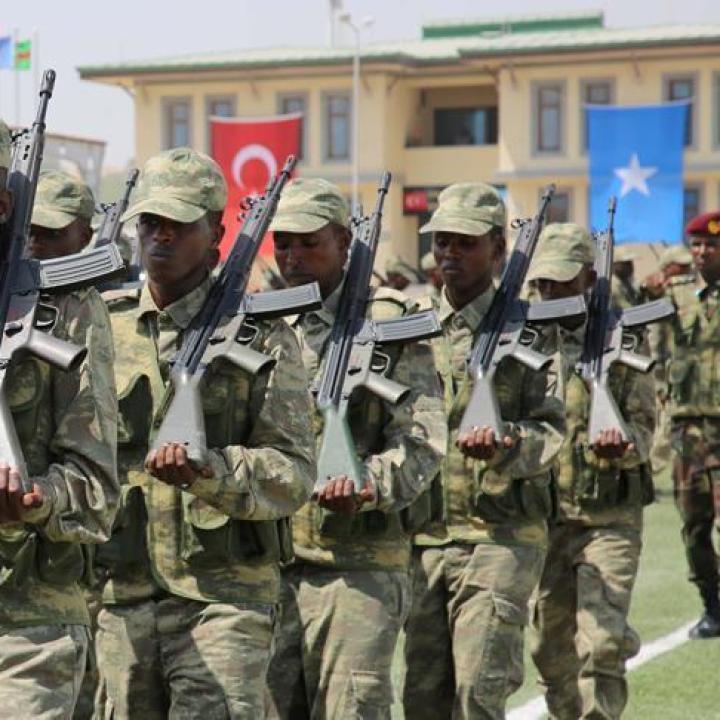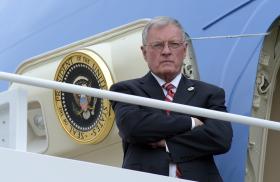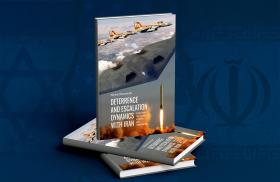
- Policy Analysis
- PolicyWatch 4094
To Halt the Jihadist Advance in Somalia, Work with Turkey and the UAE

Overhauled Turkish and Emirati training programs for the Somali army and renewed funding for the African Union mission could provide the boost that Mogadishu needs, and Washington should push for both.
On July 27, the al-Qaeda-affiliated jihadist group al-Shabab seized the town of Mahas in central Somalia. For the Federal Government of Somalia (FGS), the loss of Mahas after a series of defeats is particularly stinging, as the town was liberated by African Union (AU) and government forces in 2014. Al-Shabab’s latest onslaught, which began earlier this year, has brought it additional territories around the capital.
The empowered al-Qaeda affiliate is also still bent on attacking U.S. interests around the world. Last year, a federal court convicted an al-Shabab operative in New York of plotting a “9/11-style attack,” and in 2023, U.S. authorities charged an American citizen arrested in Kenya for attempting to join al-Shabab to attack the United States. Moreover, the UN has reported a budding tactical relationship in which the Yemeni Houthis transfer weapons and know-how to al-Shabab, while the Somali group agrees to ramp up piracy to support Houthi attacks on Red Sea shipping. Seizing more territory in Somalia gives al-Shabab additional resources and infrastructure for such activities abroad.
Al-Shabab Gains Momentum
In August 2022, the FGS launched an offensive against al-Shabab spearheaded by the Danab Brigade, a U.S.-trained Somali special forces unit. In addition, Maawisley clan militias mobilized to liberate their lands, which had been taken over by al-Shabab. By 2023, the government had regained large swaths of territory, but the small Danab Brigade was overused, the Maawisley uprisings did not spread, and the regular Somali National Army (SNA), plagued by corruption and dysfunction, proved unable to hold the liberated areas. Meanwhile, President Hassan Sheikh Mohamud has been largely focused on domestic political infighting, deploying government troops to strongarm local Jubaland authorities in July. As such, he has not adequately addressed al-Shabab’s resurgence, and the group has reversed most of the government’s gains since 2022, even venturing into areas it had not controlled for years.
One factor emboldening al-Shabab is the government’s failure to replace AU forces. After the group seized Mogadishu in 2006, Ethiopia intervened to oust it, paving the way for the creation of the African Union Mission in Somalia (AMISOM) in 2007 and the African Union Transition Mission in Somalia (ATMIS) in 2022. Military forces from Burundi, Djibouti, Ethiopia, Kenya, Uganda, and other AU countries confined al-Shabab to Somalia’s rural south and center and played a crucial role in securing population centers. The FGS has committed to the SNA taking over security responsibilities. Despite multinational efforts to train army units, however, they remain inadequate to the task. In January, the African Union Support and Stabilization Mission in Somalia (AUSSOM) officially began replacing ATMIS, but it has struggled to attract the necessary funding.
Turkish and Emirati Involvement
Turkey and the United Arab Emirates have been vying for influence in the Horn of Africa, not only in Somalia, but also to varying degrees in Eritrea, Ethiopia, and Sudan. Although they engaged in zero-sum competition in Somalia in the past, they have since come to an unwritten power-sharing arrangement there as part of a wider rapprochement. Both countries have also been training FGS forces. Improving these training initiatives and renewing funding for the AU mission could provide the push needed to stop al-Shabab, so the United States should work with each country to achieve this.
Turkey has had a substantial military presence in Somalia since 2017, when it established Camp TURKSOM, its largest overseas military base, to facilitate SNA training efforts and build the Gorgor commando unit and Haramad police unit. This April, amid an impending AU withdrawal, Ankara augmented its military contingent with 500 troops, bringing the total to about 800—perhaps the first tranche of the 2,500 troops authorized by Turkey’s parliament in July 2024.
This deployment is the latest step in Ankara’s deepening involvement in Africa in general and Somalia in particular. Last year, it signed two memorandums of understanding with Mogadishu: one on patrolling the coast and rebuilding the navy in exchange for revenues from Somalia’s exclusive economic zone, and another on petroleum exploration and exploitation. Ankara has also contributed substantial humanitarian and economic aid to Somalia since 2011. In addition, Turkish firms Favori LLC and Albayrak Group have been managing Mogadishu’s airport since 2013 and its seaport since 2014, respectively.
Although Ankara has probably not yet reached its goal of training one-third of SNA personnel, it has clearly made a mark on the army. For example, a Gorgor officer, Dayah Abdi Abdulle, served as chief of SNA land forces in 2023-24. Gorgor is second only to Danab capability-wise but is more vulnerable to political misuse, as Ankara typically does not protect the force’s command and control system as the United States does for Danab.
Turkey has also reportedly sent Akinci drones to Somalia to complement the TB2 drones used in strikes against al-Shabab. Ground troops will find the Akinci’s longer range and larger payload particularly useful for countering al-Shabab’s tactic of combining determined infantry assaults with suicide vehicle bombs.
The UAE has likewise deepened its involvement, working with the FGS, authorities in Jubaland and Puntland, as well as Somaliland, which declared independence in 1991. The Emiratis are most active in Puntland, where they have invested substantially since 2010 to develop the Puntland Maritime Police Force and build it a sizable base outside Bosaso—the site of a strategic port that has been managed by the Emirati firm DP World since 2017. The PMPF has played a crucial role in fighting al-Shabab and is also participating in a determined campaign to remove the Islamic State from its mountain strongholds in the region. The UAE has provided air support, and the campaign has included a series of U.S. airstrikes and at least one special operations raid.
In Somaliland, DP World struck deals in 2016-17 to upgrade the port of Berbera and build a base near the city. And in Jubaland, the UAE has provided military vehicles and funded training for the Jubaland Intelligence and Security Agency (JISA).
The UAE officially began training SNA personnel in 2014 but suspended the program from 2018 to 2022 due to disagreements with Mogadishu. It froze the program again in February 2024 after al-Shabab attacked General Gordon Camp in the capital, killing four Emirati officers and one Bahraini officer. Abu Dhabi has also funded training for SNA soldiers in Egypt, Eritrea, Uganda, and Djibouti as part of an initiative to raise high-quality regular units to replace AU contingents. One group of trainees, mentored in Uganda, formed a military police unit that has played an important counterterrorism role in Mogadishu.
Policy Implications
Al-Shabab’s advances make clear that efforts to bolster the SNA have been insufficient. In the short term, AU forces remain essential for protecting the FGS, highlighting the need to find a new funding mechanism for AUSSOM. Washington should work with European allies to renew this mission’s funding via the European Peace Facility. U.S. officials should also provide advice and apply diplomatic pressure when needed to ensure that AUSSOM remains effective, especially given Egypt’s planned entrance to the force and the possible departure of major contributors Uganda, Ethiopia, and Burundi. Sustaining UN support office assistance is also important.
At the same time, Washington should push for a more robust SNA training framework. Danab and Gorgor are too small and overextended to be used for territorial defense. With more Turkish troops deploying, Ankara can help expand Gorgor for future offensive operations, but it would have to commit to vetoing the force’s use for political infighting. Washington has maintained veto power over Danab’s missions to ensure it operates only against al-Shabab, and the UAE apparently restrains the PMPF at times.
This approach should extend to regular SNA training programs as well. Turkey and the UAE must insist that troops who complete such programs remain focused on the war against al-Shabab. This means helping the most competent soldiers rise through the ranks, preventing units from succumbing to misuse after training, and screening units to ensure that multiple clans are represented within SNA brigades, as done for Danab, Gorgor, and the PMPF. The U.S. government has experience implementing this more invasive type of security force assistance and should push its partners in that direction. Creating a diplomatic forum akin to the Global Coalition to Defeat ISIS could help in this regard.
Ultimately, the Turkish and Emirati initiatives stand out as the most extensive and scalable training missions in Somalia. The Danab program is the highest-quality effort but smaller scale, while the EU Training Mission is not sufficiently large or hands-on, even if it may provide some supplemental assistance. Turkey and the UAE’s performance in Somalia might also show whether they are able to take on bigger roles in other areas of U.S. interest, such as maritime security and Syria.
Ido Levy is an associate fellow with The Washington Institute’s Military and Security Studies Program and a PhD candidate at American University’s School of International Service.



